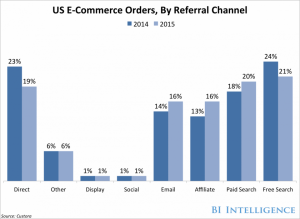Ever since you’ve launched your affiliate program, your goal has been to recruit affiliates. But are you taking the time to screen your affiliate applications and analytics reports for signs of affiliate marketing parasitism and other activities that could harm your program?
 According to BI Intelligence, affiliate marketing accounts for 16% of the U.S. eCommerce. However, per Monica Eaton-Cardone, 2% of affiliate-driven transactions are instances of affiliate fraud. For a merchant registering sales of millions of dollars that would mean huge losses.
According to BI Intelligence, affiliate marketing accounts for 16% of the U.S. eCommerce. However, per Monica Eaton-Cardone, 2% of affiliate-driven transactions are instances of affiliate fraud. For a merchant registering sales of millions of dollars that would mean huge losses.
But merchants whose affiliates engage in fraudulent and/or parasitic behaviors have more to lose than just undeserved affiliate payouts. Many times, their brand reputation suffers as well, and they lose valuable affiliates. These, in turn, mean fewer sales and lower revenue.
As a merchant or affiliate program manager, you want to be able to detect and fight affiliate marketing parasitism and related activities. Perhaps you will not follow the lead of eBay or, more recently, Amazon and turn over your affiliates to the authorities. However, you should at least identify problem affiliates, ban them from your program, and take measures to prevent other problem affiliates from joining.
How do you do that? Since you cannot fight what you do not know, the first step would be to learn the basics of affiliate marketing parasitism and other unwanted affiliate behaviors. We will cover the basics in the following lines.
Examples of Affiliate Parasitism and Worthless Activities
 In his Affiliate Program Management: An Hour A Day, our very own Geno Prussakov describes parasitism in affiliate marketing as a revenue generation method that employs technological and strategic methods harmful for the advertiser, their other affiliates, the overall program’s development, and their online marketing campaign.
In his Affiliate Program Management: An Hour A Day, our very own Geno Prussakov describes parasitism in affiliate marketing as a revenue generation method that employs technological and strategic methods harmful for the advertiser, their other affiliates, the overall program’s development, and their online marketing campaign.
Parasitic affiliates are those affiliates who reap the fruit of someone else’s work. Depending on how they do it, they can be grouped into five major categories, each including several types of parasitic activities.
1. Affiliates Relying on Adware, Toolbars, etc
These parasite affiliates resort to technology (ads, spyware, malware, toolbars, etc.) to generate payouts. Throughout time, several ways methods of using technology for affiliate marketing parasitism have emerged:
- Using downloadable software to steal user data and generate fake leads and/or sales (identity theft)
- Stuffing internet users’ browsers with affiliate cookies or code to get paid when those users make purchases without actually promoting the merchant (cookie stuffing)
- Using bots to imitate consumers and generate fake leads and orders
- Forcing clicks through ads and various traffic diversion methods
Whether illegal or unethical, these practices will end up harming your brand and reputation and deterring good affiliates from promoting your products or services. It is in your best interest to detect and sanction them.
2. Trademark Violators
These affiliates use the merchant’s trademark to drive traffic and sales. Some use it in paid search campaigns, bidding more than the merchant. Others use it or a slightly different version in their domain name.
Whether they’re cybersquatters, typosquatters, paid search bidders, or site-cloners, trademark violators do not add value to your affiliate marketing program. They steal sales and payouts from your good affiliates and take money from you without actually promoting your brand. Some may actually harm your reputation by making false promises to generate sales.
3. Affiliates Who Steal
Affiliates in this category steal coupons (call it coupon “harvesting” or any other way, if a coupon is not intended for the affiliate program, it’s no good), content, and other creatives that merchants make available exclusively to some affiliates and use them as their own. In doing so, they obviously harm the affiliates for whom the creatives were developed in the first place and the merchant, who ends up making unintended discounts and undeserved payouts.
4. Spammers
Some affiliates have access to email lists that they spam with unsolicited messages in order to generate hits and leads. Others bomb their contacts with unwanted messages on various social media platforms and even on their mobile phones. While such practices can generate traffic and leads, consumers do not appreciate spamming and may end up negatively perceiving your brand and products or services.
5. Unauthorized Sources
Although most merchants prohibit their affiliates to use explicit content, gambling, violence, politics, etc. to drive traffic and sales, not all affiliates comply. It is usually harmful to any brand to be associated with pornography, violence, racism, and even politics, so detecting and banning affiliates who use unauthorized traffic sources should be a priority for every merchant.
How to Prevent Affiliate Marketing Parasitism
There is no foolproof method to prevent affiliate parasitism but there are several measures you can take to discourage your affiliates from engaging in fraudulent and/or parasitic behaviors. Here are the most effective of them:
1. Have an Affiliate Program Agreement, Rules, and Policies
 This is the first and most important step to fighting affiliate fraud and bad affiliate behavior. Through it, you not only tell potential affiliates what you want from them and what you offer in return but you also exclude certain behavior and practices.
This is the first and most important step to fighting affiliate fraud and bad affiliate behavior. Through it, you not only tell potential affiliates what you want from them and what you offer in return but you also exclude certain behavior and practices.
We’ve already explained how you can and should create your affiliate program agreement and what it should cover in order to prevent and allow you to sanction affiliate marketing parasitism, so we will not get into further details here. If you have not yet followed our lead, now would be the best time to do it.
2. Review Affiliates Carefully, Keeping an Eye for Red Flags
You may be tempted to set your affiliate program to auto-approve all affiliate applications but that would be a huge mistake. It would mean keeping your door wide open to affiliate parasitism. Instead, review each application individually, paying special attention to the following:
-
Affiliate Website URL
Affiliate websites listed in the wrong categories, suspiciously popular website URLs, differences between the website title and the listed title, trademark use in domain name, website title, or description, etc., are all red flags. So are nonsense and recently-registered (one month or less) domain names, often employed by email spammers.
-
Promotional Methods
Some affiliates will not bother to explain their promotional methods and fill in the dedicated field in the application form with nonsensical, irrelevant phrases. Others will list promotional methods that are simply incompatible with your affiliate program and products or services. Any inconsistencies should give you food for thought and prompt you to further investigate the respective affiliate.
-
Content
One of the best ways to assess an affiliate’s potential is to visit their website and check their content. It will allow you to identify and prevent unwanted affiliates from joining your program. Keep an eye for explicit adult content, hate and crime instigation, fake news, banner collections, etc.
-
Website Availability/Accessibility
Some affiliates applying to join your program will not list any website. While it is possible to do affiliate marketing without a website, you want to reach out to them and find out how they are planning to promote your products or services. Other affiliates will list websites that are inaccessible or, worse, run dangerous scripts.
-
Affiliate Reputation
Looking up an affiliate website takes seconds and can save you tons of trouble. You may find some negative feedback on them on affiliate forums, blogs, or social networks and even accusations of affiliate marketing parasitism from other merchants or affiliates.
Just because an affiliate application raises suspicions, it does not mean you should deny it. You should give the affiliate a chance to explain their intentions and defend their application. If they do not respond, you can then reject their application or ban them from your program.
3. Ensure a Sufficient Locking Period
To earn undeserved payouts, some affiliates will offer incentives for signups and free trials. Others will use stolen credit card information to place orders through their affiliate links. You only want to pay for genuine, quality leads and sales. Setting a generous locking period helps with that.
This way, if you discover that some transactions were generated through parasitic or other unwanted practices, you can retain the corresponding payouts and avoid losing money. Just make sure that the reversals and conversion failures are indeed the result of fraudulent or parasitic activities and not related to your own website and/or products and services.
These three measures will hopefully allow you to prevent affiliate marketing parasitism and other unwanted affiliate activities. However, if you haven’t implemented them from the beginning, chances are that you already have some bad affiliates cashing undeserved payouts, harming your brand, and discouraging your good affiliates. You need to do something about those as well, and we’ll cover what you can do in the following lines.
How to Detect Affiliate Marketing Parasitism
1. Use Analytics to Detect Potential Parasites
Sudden surges in traffic, leads, or sales referred by an affiliate are usually a sure sign of unwanted affiliate behavior. Most of the times, the transactions these affiliates refer will be canceled or reversed. If you monitor your affiliates’ activity, and you should, you will immediately notice when something is wrong.
2. Monitor Fraudulent and Reversed Transactions
When an affiliate refers fake leads or fraudulent transactions repeatedly, chances are they are doing it on purpose. You can let them get away with it once, maybe cancel their commissions on the respective transactions the second time, but never allow them to remain in your program after the third strike. You would be encouraging parasitism, and you surely do not want that.
 3. Keep an Eye for Trademark Violations
3. Keep an Eye for Trademark Violations
Closely monitoring the activity of each affiliate is an impossible dream for many affiliate program managers. However, it is possible and quite easy to monitor online use and mentioning of your trademark.
You can use tools like ImmuniWeb, Google Alerts, TheSearchMonitor, AdGooroo, or Mention, to catch cyber- and typo-squatters, detect paid search campaigns, and more. Once you’ve detected unwanted activity, you can track the affiliate behind it and remove them from your program.
4. Monitor Your Online Reputation
As mentioned above, some affiliates will do anything to generate leads or sales and make money. They will advertise fake discounts and lower prices and promise incentives and rewards that your customers will never receive. In doing so, they will undermine your credibility and ruin your reputation.
One way to catch them is to monitor customer feedback. Dissatisfied customers are of no help to any business. If yours are dissatisfied because of something you can control, like product or service quality, finding out the source of their discontent can help you improve your offer.
If they are dissatisfied because of something that your affiliates did or promised but never delivered, you can clarify things, track the affiliates responsible, and take measures against them. Some great tools for monitoring your online reputation are: SentiOne, Hootsuite, BrandWatch, and Reputology.
5. Request Affiliate Feedback
As an affiliate program manager, it is in your best interest to keep your good affiliates close and obtain their feedback on your program. In your affiliate communications, encourage them to report parasitism and other bad affiliate behaviors. Act on their reports and show them that you value their feedback and disapprove of all fraudulent and parasitic activities.
How to Fight Affiliate Marketing Parasitism
 It does not matter if you’ve detected parasites among your affiliates by yourself or their existence was reported to you. What matters is that you take measures against them fast. The first thing you should do is to closely investigate the respective affiliates’ activity.
It does not matter if you’ve detected parasites among your affiliates by yourself or their existence was reported to you. What matters is that you take measures against them fast. The first thing you should do is to closely investigate the respective affiliates’ activity.
On one hand, you want evidence of their illegal or unethical behavior. You would not want to ban or withhold payouts to a good affiliate. On the other hand, you want to understand your affiliates’ methods, so as to be able to prevent and fight similar future attempts.
Perhaps you will need to amend your program terms and conditions, invest in new software, or review your affiliate applications approval policy. When you take action against an affiliate, you want to make sure that your actions are in line with your program rules and policies.
After all, everything that is not forbidden is allowed, and you do not want to deny “rightfully” earned payouts. Whenever you are in doubt regarding an affiliate’s activity, you should give them a chance to explain themselves. If they do not, then your suspicions are probably correct and you can and should ban them from your program.
Whether you have a hard time preventing, detecting, proving, and fighting affiliate marketing parasitism by yourself or you simply want to exchange thoughts and ideas, don’t hesitate to get in touch. As a professional affiliate program management agency, we have come across all types of unwanted affiliate behaviors and we have made it our mission to protect the affiliate marketing programs we manage against them. We will gladly share our knowledge and expertise with anyone in need.